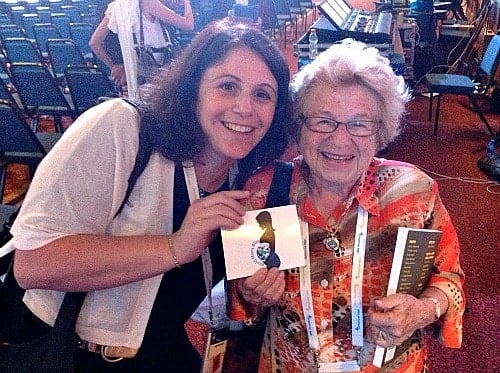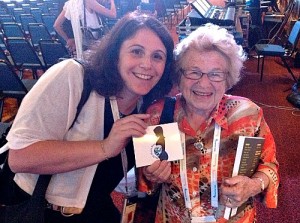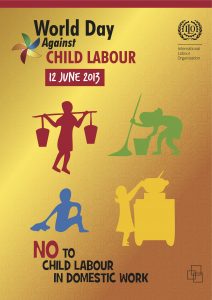
by Natalia Rankine-Galloway (Morocco) | Jul 17, 2013 | Body Image, Cultural Differences, Culture, Expat Life, Feminism, International, Life Lesson, Living Abroad, Morocco, Religion, Saudi Arabia, Sexuality, Travel, Uncategorized, World Motherhood
 Recently, my boobs took a trip to Jordan. At least it seemed at the time that the rest of me was just along for the ride. Never had my cleavage gotten so much attention; never had it occupied my thoughts so completely.
Recently, my boobs took a trip to Jordan. At least it seemed at the time that the rest of me was just along for the ride. Never had my cleavage gotten so much attention; never had it occupied my thoughts so completely.
Having lived in Morocco for almost a year, I thought I knew how to strike the proper balance….somewhere between my usual, US appropriate signature style and a more modest décolletage that I felt was an appropriate concession to my host country’s social norms.
This balance was clearly off-kilter for Jordan. My ensembles were getting more attention from the male Jordanian population than a Britney Spears get up. Given that I have been a little sensitive about my dwindling cup size since giving up nursing my son, I was momentarily flattered….before being sincerely uncomfortable and confused.
I knew in theory that one country in the Middle East or North Africa would not necessarily adhere to the same standards of dress for women as the next, just as various areas or social classes within Morocco dressed worlds apart.
(more…)
Natalia was born a stone's throw from the Queen's racetrack in Ascot, UK and has been trying to get a ticket to the races and a fabulous hat to go with it ever since. She was born to a Peruvian mother and an Irish father who kept her on her toes, moving her to Spain, Ireland and back to the UK before settling her in New York for the length of middle and high school. She is still uncertain of what she did to deserve that.
She fled to Boston for college and then Washington, D.C. to marry her wonderful husband, who she met in her freshman year at college. As a military man, he was able to keep her in the migratory lifestyle to which she had become accustomed. Within 5 months of marriage, they were off to Japan where they stayed for a wonderful 2 and one half years before coming home to roost. Baby Xavier was born in New York in 2011 and has not slept since.
A joy and an inspiration, it was Xavier who moved Natalia to entrepreneurship and the launch of CultureBaby. She has loved forging her own path and is excited for the next step for her family and CultureBaby.
Natalia believes in the potential for peace that all children carry within them and the importance of raising them as global citizens. She loves language, history, art and culture as well as Vietnamese Pho, Argentinian Malbec, English winters, Spanish summers and Japanese department stores...and she still hopes one day to catch the number 9 race with Queen Liz.
You can find her personal blog, The Culture Mum Chronicles.
More Posts

by Susan Koh | Jul 11, 2013 | Inspirational, International, Life Lesson, Motherhood, Parenting, Singapore, Susan Koh, World Moms Blog, World Motherhood
 I’m pretty confident when I say I have most things under control at home. But when it comes to driving, that’s where I fail miserably. I got my driving license 10 years years ago, and by right, driving to me should be easy peasy by now. But just like teaching a child to ride a bike, we all know that practice makes perfect. And that sums up why I’m so lousy at it because no drive equals no practice.
I’m pretty confident when I say I have most things under control at home. But when it comes to driving, that’s where I fail miserably. I got my driving license 10 years years ago, and by right, driving to me should be easy peasy by now. But just like teaching a child to ride a bike, we all know that practice makes perfect. And that sums up why I’m so lousy at it because no drive equals no practice.
Over the weekends, I had to drive. Had to because my dear husband extracted two of his wisdom teeth and was feeling very uncomfortable behind the wheels. So as his wife, here’s when I have to rise to the occasion to relieve him. So I agreed to take over, grudgingly.
My little back seat driver was observing me and parroting Alexis’s instructions to me to slow down, drive straight, don’t turn so fast. Sensing that I was getting more and more frustrated as I drove, she told me, “Mummy, don’t drive until so angry. Just drive. Drive slowly okay.” In my head, I thinking that having her in the car is such a bad idea as she’s seeing the worst of me.
At some point when I have to manuveour between changing gears and the hand brakes to go up a slope, I nearly burst out crying and exclaimed exasperatedly at my husband and child, “I’m trying, I trying my best ok!” (more…)
Susan is from Singapore. As a full-time working mom, she's still learning to perfect the art of juggling between career and family while leading a happy and fulfilled life. She can't get by a day without coffee and swears she's no bimbo even though she likes pink and Hello Kitty. She's loves to travel and blogs passionately about parenting, marriage and relationship and leading a healthy life at A Juggling Mom.
More Posts

by Mamma Simona (South Africa) | Jul 10, 2013 | Divorce, Friendship, Husband, International, Living Abroad, Marriage, Moving, Relationships, South Africa, Uncategorized, World Motherhood
 On 15 May I wrote a post about searching for an old boyfriend, which caused a few of my awesome fellow WMB moms to don their detective hats. They helped me find two possible addresses for the man I was looking for. After much soul-searching, I eventually decided to send a letter to each address. Just over two weeks ago, I printed the letters, added a copy of my blog post (as well as a copy of the last poem he’d sent me) to each envelope and invested 25 rand in postage fees. I was told that the letters would take approximately 14 days to reach America.
On 15 May I wrote a post about searching for an old boyfriend, which caused a few of my awesome fellow WMB moms to don their detective hats. They helped me find two possible addresses for the man I was looking for. After much soul-searching, I eventually decided to send a letter to each address. Just over two weeks ago, I printed the letters, added a copy of my blog post (as well as a copy of the last poem he’d sent me) to each envelope and invested 25 rand in postage fees. I was told that the letters would take approximately 14 days to reach America.
To be perfectly honest, I didn’t really expect a reply. Imagine my surprise when exactly 2 weeks after mailing my letters, I found an email in my inbox from “my” Campbell T Fisher Jr (aka Toby)! (more…)
Mamma Simona was born in Rome (Italy) but has lived in Cape Town (South Africa) since she was 8 years old. She studied French at school but says she’s forgotten most of it! She speaks Italian, English and Afrikaans. Even though Italian is the first language she learned, she considers English her "home" language as it's the language she's most comfortable in. She is happily married and the proud mother of 2 terrific teenagers! She also shares her home with 2 cats and 2 dogs ... all rescues.
Mamma Simona has worked in such diverse fields as Childcare, Tourism, Library Services, Optometry, Sales and Admin! (With stints of SAHM in-between). She’s really looking forward to the day she can give up her current Admin job and devote herself entirely to blogging and (eventually) being a full-time grandmother!
More Posts - Website
Follow Me:


by Olga Mecking | Jul 1, 2013 | 2013, Being Thankful, Child Care, Family, Girls, Grandparent, Health, Husband, International, Life Lesson, Marriage, Me-Time, Motherhood, Netherlands, Parenting, Siblings, Travel, World Motherhood, Younger Children
 Imagine yourself in our situation. Your friends are getting married. The wedding is in beautiful Italy. You decide to go, even if it means leaving your two daughters with your parents-in-law, and just take the baby with you. Your in-laws arrive and you ask them to take your 3-year old to dancing class, show them where all the things are and tell them when to bring the girls to daycare. You’re excited. You pack your bags the day before the wedding and go to bed.
Imagine yourself in our situation. Your friends are getting married. The wedding is in beautiful Italy. You decide to go, even if it means leaving your two daughters with your parents-in-law, and just take the baby with you. Your in-laws arrive and you ask them to take your 3-year old to dancing class, show them where all the things are and tell them when to bring the girls to daycare. You’re excited. You pack your bags the day before the wedding and go to bed.
But you don’t sleep. Instead, you talk. You tell your husband that you’re not really happy with this arrangement. That you don’t trust your in-laws enough to leave your children with them. That you don’t even feel good about your decision to leave the children with anyone. In the end you start crying and tell your husband that your eldest daughter doesn’t like you and that you’re the worst mom ever.
And then your husband tells you that you’re an amazing mom. After you calm down and feel somewhat better he tells you that he’s not happy with this arrangement, either. You see, our little girl has just had the chicken pox, and according to my husband’s calculation, our baby would be at risk of getting it right during our trip to Italy. The baby was fussy for the last few days, he has had no fever, but his temperature is slightly elevated. What to do?
Consider two possibilities.
Number one: You decide to stay. You’re afraid that if he’s going to get the chicken pox, it will spoil your whole trip. You don’t want the other children to get it, too, and besides, traveling with a fussy baby full of ugly itchy red spots is no fun. You tell your in-laws in the morning. They stay for a few days, but that’s OK. Your MIL learns to accept your decisions and to get out of your way when you sit down to read a book. You learn to tell her when you’re overwhelmed and exercise your privileges as a mom.
When your children wake up in the morning, you feel as if you haven’t seen them for ages. You’re suddenly full of patience. You’re relieved that you didn’t have to leave without them. You braid your big girl’s hair in twelve pink little braids. You feel great. Your decision isn’t entirely selfless. You don’t trust your in-laws and don’t want to leave the girls with them, and that’s OK.
Number two: You wake up in the morning, check your baby’s temperature and decide he won’t get the chicken pox after all. You pack your bags, kiss the girls goodbye and leave to catch your flight. You have fun at the wedding, you dance and sing and eat delicious food. You realize that you haven’t had a vacation for ages. You enjoy waking up in the morning without having to get three children dressed and ready for the day. You get to have a whole conversation with your husband. You go back home and are happy to see your children again. You feel great and relaxed and you’re sure that going to that wedding was exactly what you needed right now. Your decision isn’t entirely selfish. You know very well that having a short vacation will make you more relaxed and a better mom. And that’s OK, too.
How did we choose? We stayed. I was sad not to be there when our friends said: “I do”. Our son didn’t get the chicken pox; his skin is silky smooth as always. So, was it a bad decision? No. Would it have been a bad decision had we gone? No. The thing is that while I decided to stay, if it hadn’t been for the chicken pox threat, I would have gone to that wedding.
You can make a selfish decision and still be a good mom. You can make a decision seen as selfless and make it for purely selfish reasons. It doesn’t matter. You’re a good mom.
Have you ever been in this sort of predicament? What did/would you do?
This is an original post to World Moms Blog from our writer and mother of three in The Netherlands, Olga Mecking.
The photograph used in this post is attributed to the author.
Olga is a Polish woman living in the Netherlands with her German husband. She is a multilingual expat mom to three trilingual children (even though, theoretically, only one is trilingual since she's old enough to speak). She loves being an expat, exploring new cultures, learning languages, cooking and raising her children. Occasionally, Olga gives trainings in intercultural communication and works as a translator. Otherwise, you can find her sharing her experiences on her blog, The European Mama. Also take a while to visit her Facebook page .
More Posts - Website
Follow Me:




by Susie Newday (Israel) | Jun 26, 2013 | 2013, International, Israel, Media, Social Good, Social Media, Susie Newday
 I don’t know why it is, but I have yet to come across any initiative, no matter how praiseworthy, that doesn’t have people criticizing some aspect of it. The Israeli Presidential Conference that I attended last week was no exception.
I don’t know why it is, but I have yet to come across any initiative, no matter how praiseworthy, that doesn’t have people criticizing some aspect of it. The Israeli Presidential Conference that I attended last week was no exception.
The conference, in its fifth year, is aptly titled “Facing Tomorrow.” Held under the auspices of 90 year old President Shimon Peres (may I have as much energy as him at that age), the conference saw 4500 people from around the world get together, inspire each other, and talk about topics facing us now and in the future. The conference was attended by world leaders, politicians, diplomats, international scholars, activists, poets, scientists, artists, clergy, entrepreneurs, economists and industrialists, as well as representatives of the next generation of leaders. There were plenary sessions, panels, roundtables and master classes that discussed a wide spectrum of topics with about 200 speakers representing some of the worlds brightest minds. (more…)
Susie Newday is a happily-married American-born Israeli mother of five. She is an oncology nurse, blogger and avid amateur photographer.
Most importantly, Susie is a happily married mother of five amazing kids from age 8-24 and soon to be a mother in law. (Which also makes her a chef, maid, tutor, chauffeur, launderer...) Susie's blog, New Day, New Lesson, is her attempt to help others and herself view the lessons life hands all of us in a positive light. She will also be the first to admit that blogging is great free therapy as well. Susie's hope for the world? Increasing kindness, tolerance and love.
You can also follow her Facebook page New Day, New Lesson where she posts her unique photos with quotes as well as gift ideas.
More Posts - Website
Follow Me:






by Jennifer Prestholdt (USA) | Jun 11, 2013 | 2013, Human Rights, International, Morocco, World Moms Blog, World Voice

Photo by Jennifer Prestholdt
Hidden Child Labor
While millions of tourists visit Morocco every year, very few are aware of a hidden human rights abuse that is occurring behind closed doors in Morocco’s cities. Morocco has one of the worst child domestic labor problems in North Africa. The International Labour Organization (ILO) has estimated that between 66,000 and 88,000 children between the ages of 7 and 15 – 70% of whom are under age 12 – are working as domestic servants in Morocco.
These children work long hours for little pay and often suffer physical and other forms of abuse. Because domestic work is “women’s work” in Morocco, virtually all of these child domestic workers are girls. In Morocco (a country with a French colonial history), these child domestic workers are called petites bonnes or “little maids”.
I had the opportunity to learn more about the petites bonnes issue during a recent trip to Morocco. The United States Department of Labor’s Bureau of International Labor Affairs describes the problem like this:
Young girls are sent to work as live-in domestic servants, often before they reach age 10. Parents sell their daughters or receive payment of wages in exchange for their daughters’ service. These petites bonnes (little maids) often face conditions of involuntary servitude, including long hours without breaks; physical, verbal and sexual abuse; withheld wages and even restrictions on their movement. Frequently, they are sent from rural villages to more urban areas, and find it difficult to make their way home. Most petites bonnes are denied an education, and illiteracy rates are high among this population.
The Difficult Life of a Petite Bonne
The situation of petites bonnes in Morocco results from a combination of poverty, gender inequality, and lack of access to education. Girls – some as young as my own 8-year-old daughter – are sent to work as petites bonnes to generate income to support their families. They come from poor rural areas to work in cities such as Casablanca, Rabat, Marrakech, Tangiers, Agadir, and Fes. Intermediaries generally broker the arrangement, receiving a fee from the employer. Petites bonnes interviewed by Human Rights Watch reported that their employers frequently beat and verbally abused them, denied them the chance to go to school, and sometimes even refused to provide them with adequate food and sleeping facilities.
In a strange city, separated from their families and often speaking a Berber language instead of the Arabic spoken by a majority of Moroccans, many petites bonnes are extremely isolated and vulnerable. The isolation, along with the privacy of the homes, increases the chance of sexual abuse by male members of their employers’ household. In fact, several studies have found that many unwed young mothers in shelters in Morocco were petites bonnes when they became pregnant.
The difficult life of a petite bonne sometimes ends tragically. The widely reported story of little Khadija, an 11-year-old petite bonnewho was beaten to death by her employer in July 2011, raised calls for the government to take action on the issue. In January 2013, a 17 year old petite bonne in Casablanca attempted suicide by jumping from the fourth floor of her employers’ home. Amateur video of the suicide attempt that was circulated on the internet shocked Moroccans. Most recently, on March 24, 2013, a young domestic worker was taken to the hospital in Agadir with third degree burns on multiple parts of her body. Only 14 years old, she died from the injuries allegedly inflicted by her employers, prompting a UN representative in Morocco to decry child domestic labor by girls as “one of the worst forms of child exploitation” and call on the government to take action. Yet, thousands of petites bonnes in Morocco continue to suffer in silence.
Gaps in Legal Protection
According to NGOs working to help petites bonnes in Morocco, part of the problem relates to gaps in and difficulties with implementation of Moroccan laws. While Moroccan law prohibits employment of children under the age of 15, Morocco’s Labor Code does not apply to domestic work. Therefore, the Labor Codes’ protections for workers regarding hours worked (44 hours per week) and pay (2,333 dirhams or approximately $261 per month) do not apply. Human Rights Watch has documented that petites bonnes work long hours, often seven days a week. They earn an average of 545 dirhams (approximately $61) per month, but some earn as little as 100 dirhans (approximately $11).
In addition, Morocco ratified the Convention on the Rights of the Child (CRC) in 1993 and the ILO Convention No 182 on the Worst Forms of Child Labor. Both international treaties prohibit economic exploitation and employment of children in work that is likely to be hazardous, interfere with their education, or harm their health, safety or development. Unfortunately, neither have been implemented in a way that provides adequate protection to the petites bonnes.
Some Progress in Protecting Children
There is some indication that things are starting to change in Morocco. The government and international human rights organizations report that the number of girls working as petites bonnes is declining. This is due in part to the fact that public awareness about the problems faced by petites bonnes has been raised because of increased media attention to the issue and public education campaigns undertaken by the Moroccan government, NGOs, and United Nations agencies. The Moroccan government has also taken steps to increase school enrollment and this has helped reduce the number of children engaged in child labor.
Yet still more needs to be done. Since 2006, the government has been working on a draft law on domestic work that would for the first time establish a legal framework to better protect petites bonnes, secure rights such as a weekly day of rest and annual leave, and impose sanctions on employers. The Moroccan government has said that the draft Law on Domestic Workers is one of its priorities, but the bill has not yet been considered and passed by Parliament.
Take Action on June 12 – World Day Against Child Labour!
 The problem of child domestic workers is not unique to Morocco. In fact, there are an estimated 15.5 million child domestic workers worldwide. The widespread use of children as domestic servants is one of the most hidden forms of child labor.
The problem of child domestic workers is not unique to Morocco. In fact, there are an estimated 15.5 million child domestic workers worldwide. The widespread use of children as domestic servants is one of the most hidden forms of child labor.
The exploitation of children, particularly girl domestic workers like petites bonnes, is a serious violation of children’s rights. It perpetuates inequality and inter-generational poverty, and deprives girls of their right to education, health, participation and protection. It also prevents children from acquiring the life skills and education necessary to improve their future.
To draw attention to the issue of child labor, the United Nations has recognized June 12 as the World Day Against Child Labour. In 2013, the focus is on child domestic workers like the petites bonnes of Morocco. On the 2013 World Day Against Child Labour, the international community is calling for legislative and policy reforms to ensure the elimination of child labor in domestic work and the provision of decent work conditions and appropriate protection to young workers in domestic work who have reached the legal working age. In Morocco, the government should:
• Strictly enforce the minimum age of 15 for all employment (including domestic work) and ensure that all children (particularly girls) enjoy the right to free and compulsory basic education;
• Adopt a domestic worker law that ensures compliance with the 2011 ILO Convention 189 on decent work for domestic workers
• Create an effective system for identifying, removing and rehabilitating child domestic workers from illegal or abusive employment.
• Criminally prosecute individuals responsible for violence or other criminal offenses against child domestic workers.
In addition, the World Day Against Child Labour provides the opportunity for all of us to take action to build the worldwide movement against child labor.
Take Action to end child labor. Learn what you can do to inform yourself and raise awareness in your community. The ILO’sSCREAM (Supporting Children’s Rights through Education, the Arts and Media) programme has factsheets, presentations, postcards, poems, and more. The SCREAM education pack is available in multiple languages.
Join the 12to12 to End Child Labour community. Learn more about the issue and join the 12to12 Community Portal, which provides a common platform for experience and knowledge sharing on research, activities and events related to the World Day Against Child Labour.
Find out what kids and teens can do to help. The ILO’s Youth in Action against Child Labour campaign has ideas, information, videos and other resources to help young people take action to end child labor.
Make a pinwheel with your kids. The pinwheel has become the symbol of the international fight against child labor. The pinwheel campaign to raise awareness about child labor began in Brazil in 2004. The five blades of the pinwheel represent the different continents of the world and the wind that makes the pinwheel spin is the will to act and to pass on the message until all countries take adequate measures to end child labor. Download a kit to make a pinwheel to keep the movement going!
This is an original World Moms Blog post written by Jennifer Prestholdt.
Were you aware of the international child labor issue? Does it exist in the country in which you live?

Jennifer Prestholdt is a lawyer and the Deputy Director of The Advocates for Human Rights, a volunteer-based human rights organization that works locally, nationally and internationally. Her work in human rights takes her around the world, but she spends most of her time in Minneapolis, MN, where she lives with her children (two sons and one daughter), her husband, an elderly cat and a dwarf hamster.
As Jennifer’s kids are now all in school (1st, 4th and 6th grades), she is finally finding more time to do the things that she used to love to do, especially running, writing and knitting. Jennifer loves to travel and has had the dubious distinction of having been accidentally locked in a bathroom on five continents so far. Australia and Antarctica await!
In January 2011, Jennifer made a New Year’s Resolution to start writing about her experiences in order to share with her children the lessons learned from 15 years of work in human rights. The result is her personal blog, The Human Rights Warrior. The name comes from her son Simon, who was extremely disappointed to learn that his mother is a lawyer, not a warrior.
You can find her on her blog The Human Rights Warrior or on Twitter @Jprestholdt.
More Posts

 Recently, my boobs took a trip to Jordan. At least it seemed at the time that the rest of me was just along for the ride. Never had my cleavage gotten so much attention; never had it occupied my thoughts so completely.
Recently, my boobs took a trip to Jordan. At least it seemed at the time that the rest of me was just along for the ride. Never had my cleavage gotten so much attention; never had it occupied my thoughts so completely.

 I’m pretty confident when I say I have most things under control at home. But when it comes to driving, that’s where I fail miserably. I got my driving license 10 years years ago, and by right, driving to me should be easy peasy by now. But just like teaching a child to ride a bike, we all know that practice makes perfect. And that sums up why I’m so lousy at it because no drive equals no practice.
I’m pretty confident when I say I have most things under control at home. But when it comes to driving, that’s where I fail miserably. I got my driving license 10 years years ago, and by right, driving to me should be easy peasy by now. But just like teaching a child to ride a bike, we all know that practice makes perfect. And that sums up why I’m so lousy at it because no drive equals no practice.
















